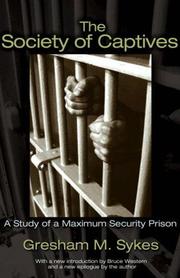| Listing 1 - 2 of 2 |
Sort by
|

ISBN: 0691130647 9780691130644 Year: 2007 Publisher: Princeton : Princeton University Press,
Abstract | Keywords | Export | Availability | Bookmark
 Loading...
Loading...Choose an application
- Reference Manager
- EndNote
- RefWorks (Direct export to RefWorks)
The author wrote the book at the height of the Cold War, motivated by the world's experience of fascism and communism to study the closest thing to a totalitarian system in American life : a maximum security prison. His analysis calls into question the extent to which prisons can succeed in their attempts to control every facet of life--or whether the strong bonds between prisoners make it impossible to run a prison without finding ways of "accommodating" the prisoners.
Prison administration --- Prisoners --- Prisons --- History --- State Prison, Trenton (N.J.) --- Prisonniers --- Administration --- Histoire. --- History. --- Geschichte 1958. --- New Jersey. --- African Americans. --- Bettelheim, Bruno. --- Driscoll, Alfred E. --- East, Norwood. --- Fleisher, Mark. --- Irwin, John. --- Jacobs, James. --- Language and Society (Lewis). --- McKorkle, Lloyd. --- Messinger, Sheldon L. --- National Research Council. --- Ohlin, Lloyd. --- Rhodes, Lorna. --- Strong, S. A. --- Useem, Bert. --- ball busters. --- center men. --- custodians. --- escape artists. --- gorillas. --- guards. --- hipsters. --- incarceration. --- merchants. --- penal labor. --- penology. --- prisons. --- quantification. --- real men. --- social groups. --- sociology. --- swag. --- toughs. --- violence. --- weaklings. --- wolves.
Book
ISBN: 0691231109 Year: 2004 Publisher: Princeton, N.J. : Princeton University Press,
Abstract | Keywords | Export | Availability | Bookmark
 Loading...
Loading...Choose an application
- Reference Manager
- EndNote
- RefWorks (Direct export to RefWorks)
With the transformation and expansion of the nineteenth-century American literary canon in the past two decades, the work of the era's American women poets has come to be widely anthologized. But scant scholarship has arisen to make full sense of it. From School to Salon responds to this glaring gap. Mary Loeffelholz presents the work of nineteenth-century women poets in the context of the history, culture, and politics of the times. She uses a series of case studies to discuss why the recovery of nineteenth-century women's poetry has been a process of anthologization without succeeding analysis. At the same time, she provides a much-needed account of the changing social contexts through which nineteenth-century American women became poets: initially by reading, reciting, writing, and publishing poetry in school, and later, by doing those same things in literary salons, institutions created by the high-culture movement of the day. Along the way, Loeffelholz provides detailed analyses of the poetry, much of which has received little or no recent critical attention. She focuses on the works of a remarkably diverse array of poets, including Lucretia Maria Davidson, Lydia Sigourney, Maria Lowell, Frances Ellen Watkins Harper, Emily Dickinson, Helen Hunt Jackson, and Annie Fields. Impeccably researched and gracefully written, From School to Salon moves the study of nineteenth-century women's poetry to a new and momentous level.
American poetry --- Women and literature --- History and criticism. --- History --- Women authors --- AME Recorder. --- American Revolution. --- Amherst College. --- Bennett, Michael. --- Bercovitch, Sacvan. --- Bradstreet, Anne. --- Bryant, William Cullen. --- Bryn Mawr College. --- Butler, Judith. --- Civil War, English. --- Clark, Suzanne. --- Crain, Patricia. --- Dayan, Joan. --- Emancipation Proclamation. --- Finch, Annie. --- Foucault, Michel. --- Gliddon, George. --- Graham, Maryemma. --- Harper, Frances Ellen Watkins. --- Howe, Susan. --- Irwin, John. --- Jackson, Virginia. --- Karcher, Carolyn. --- Looby, Christopher. --- Noble, Marianne. --- Pinsky, Robert. --- Reconstruction. --- Robbins, Sarah. --- Sherman, Sarah. --- Sorisio, Carolyn. --- Taylor, Orville. --- Vassar College. --- Watts, Emily. --- Wellesley College. --- abolitionism. --- apostrophe. --- autonomy, aesthetic. --- child prodigy, as poet. --- didacticism. --- disciplinary intimacy. --- disinterestedness. --- elegy. --- elocution. --- ethnology. --- hieroglyphics, Egyptian. --- masque, pastoral. --- nationalism. --- orientalism. --- recovery projects. --- republican motherhood. --- romantic titanism. --- slave narratives.
| Listing 1 - 2 of 2 |
Sort by
|

 Search
Search Feedback
Feedback About UniCat
About UniCat  Help
Help News
News